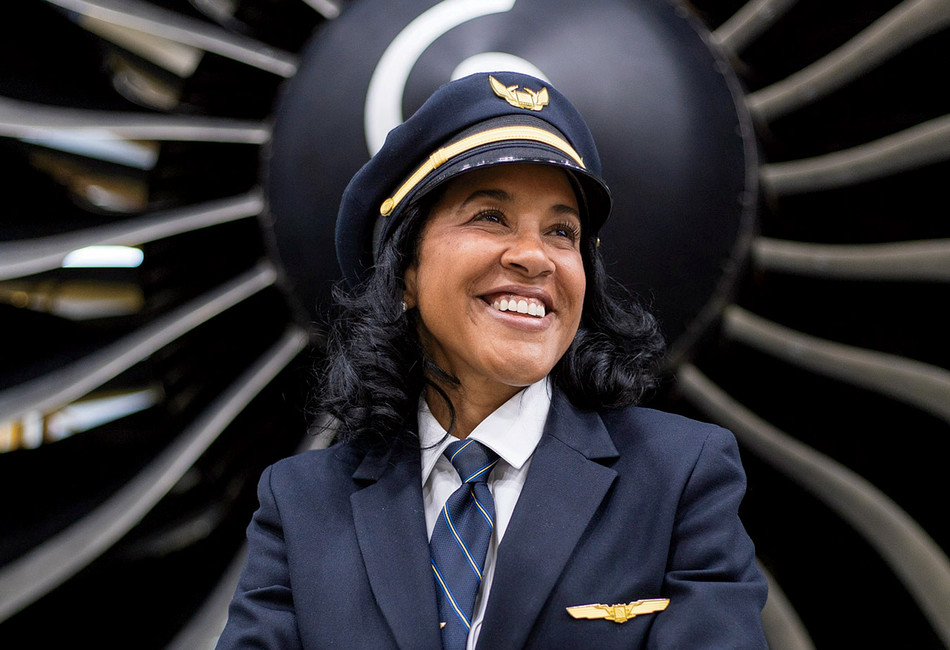Carole Hopson ’90JRN vividly remembers the first time she flew a plane — the feel of the controls in her hand as she lifted into the air, the sun glittering on the runway, the view of the horizon from the cockpit window.
“It was forty-five minutes of my life, but it changed me forever,” she says.
Hopson was thirty-two years old when she took her first flight lesson, and it would take her nearly twenty more years to land her dream job, as a commercial pilot with United Airlines. Now she has a new mission: making her profession more accessible to other Black women.
Even as a child growing up in the suburbs of Philadelphia, Hopson was enthralled by the idea of flight. She used to lie in her grandmother’s backyard and watch the planes overhead, wondering where they were going.
“Honestly, it never even occurred to me that it was something I could do,” Hopson says. “That was not presented as an option for a little Black girl with eyeglasses.”
Instead, Hopson studied literature at the University of Virginia and journalism at Columbia, worked as a police reporter in New Jersey, and then switched to public relations, with stints at the NFL and Foot Locker. Her first flight lesson was a gift from her husband, who knew how much she loved flying and thought it would make a good hobby.
Hopson knew immediately that she wanted it to be more than that, but the training was prohibitively time-consuming and expensive. At the time, nearly three-quarters of commercial pilots came from a military background; to train as a civilian costs about $150,000, and between flight school, logging enough hours to become certified, and completing a training program with an airline, it can take years.
For Hopson, it was even longer than expected. She delayed flight school for two years to save money. Then, just as she finished training, the events of September 11 upended the airline industry and made it difficult for her to find a job. Hopson decided to again postpone her dream and focused on raising her two boys, now teenagers. Still, she never gave up hope. Throughout her sons’ childhood, she worked part-time as a flight instructor to get time in the air and practiced on a flight simulator, taking shifts in the middle of the night to log hours: “I did everything that I could do to keep flying.”
In 2018, Hopson started flying full-time for United and realized how few of her colleagues looked like her. “According to the FAA, less than 1 percent of commercial pilots are Black women,” she says. “I often felt like the only one.”
Hopson wanted to help other Black women overcome some of the hurdles that she had faced, and she has pledged to enroll one hundred Black women in flight school by 2035.
Hopson’s approach is three-pronged. She visits high schools in targeted areas to increase awareness about flying as a career option. She is actively fundraising to reduce the financial burden of flight training. And she is working to recruit students at the Lieutenant Colonel Luke Weathers Jr. Flight Academy, a new Mississippi flight school named for a Tuskegee Airman that aims to diversify the airline industry and provide opportunities for Black student pilots. In November, Hopson plans to launch a nonprofit organization called the Jet Black Foundation, dedicated to these goals.
In addition to these efforts, Hopson has also written a novel based on the life of Bessie Coleman, the first Black woman to hold a pilot’s license. Coleman, who was born into a family of Texas sharecroppers in 1892, learned to fly in Europe after being rejected from every American flight school. Hopson hopes that her story will resonate with other Black women. “I learned about Amelia Earhart and Charles Lindbergh in school. But I had never heard of Bessie Coleman until I became a pilot myself,” she says.
Hopson says that as a Black woman, she has felt like an anomaly in most of the jobs she’s had — as a journalist working the crime beat, in sports PR, and today. But she feels especially motivated to change the airline industry, since she loves it so much.
“The fact that a job like this exists still amazes me,” Hopson says. “Why wouldn’t I want to share it?”
This article appears in the Fall 2021 print edition of Columbia Magazine with the title "Pilot Program."



